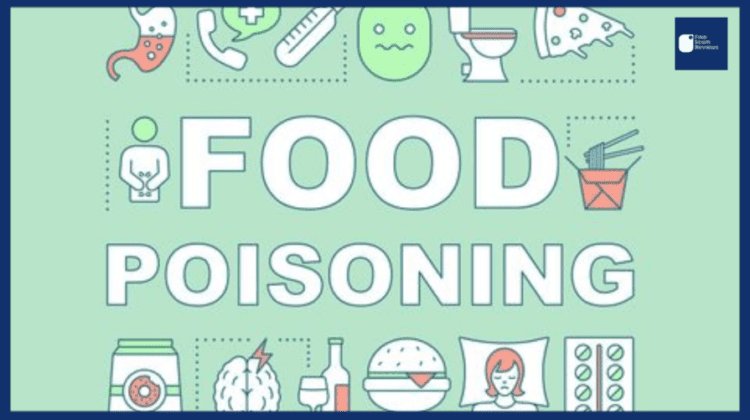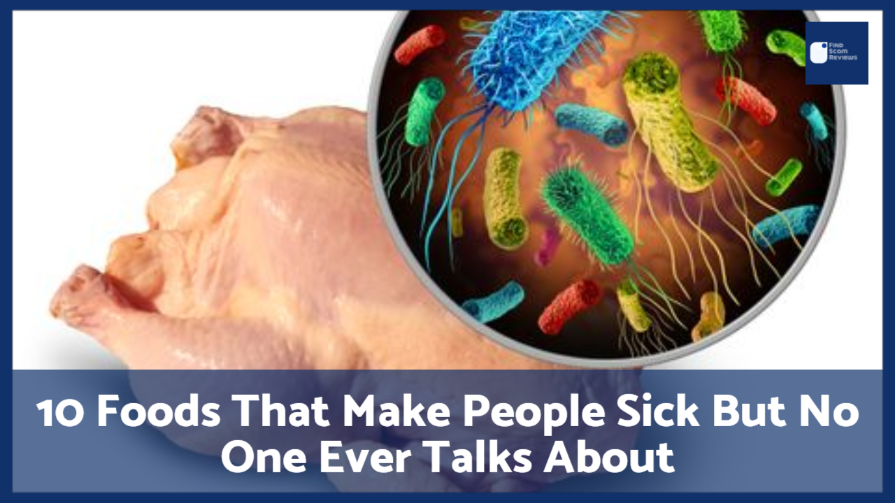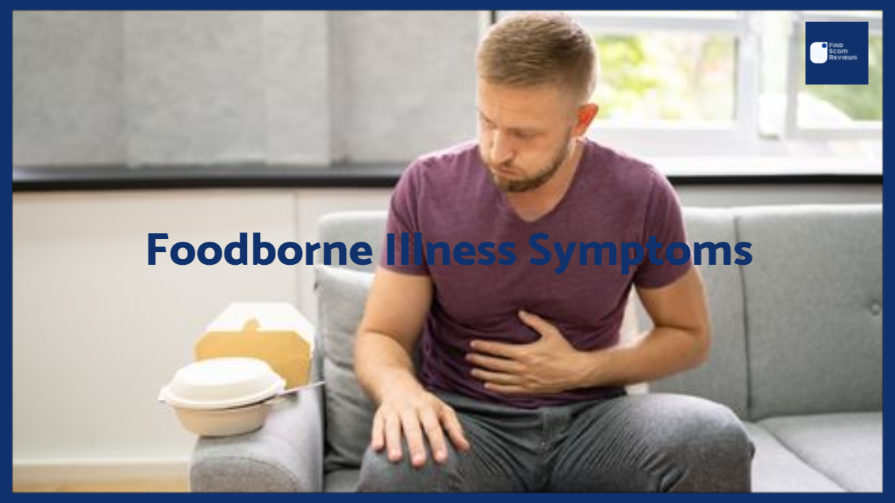
Food that makes people sick will often:
- taste sharp or bitter
- bumpy with odd color
- smell slightly woody
- strange color d taste, and more
Here are The Five Signs You’re About To Eat Food That Will Make You Sick
“Food poisoning will often make people feel like they are dying.”
Few things are more frustrating than getting sick after eating something you thought was safe. Whether it’s a stomach bug or food poisoning, it’s always a bummer. No one wants to get sick, but it can be hard to avoid if you don’t know the signs that food will make you sick.
In this article, we will explore five of the most common signs that the food you’re about to eat is not safe. This article will help you avoid getting sick from food poisoning, from expiration dates to cooking temperatures.
The Five Signs You’re About To Eat Food That Will Make You Sick
1. The food is expired.
The food is expired. Please don’t eat it.
2. The food that has been situated is unsafe if out for too long.
If the food has been sitting out, eating is not safe.
3. The food is not cooked correctly.
Undercooked meat, poultry, and eggs can cause food poisoning. Ensure these foods are cooked to the proper temperature to kill harmful bacteria.
4. The food has been contaminated.
If the food has come into contact with raw meat, poultry, or eggs, it may be contaminated and should not be eaten.
5. You’re not feeling well after eating feeling
If you start to feel sick after each, stop eating and see a doctor.
10 Foods That Make People Sick But No One Ever Talks About

1. Raw chicken
Raw chicken can contain harmful bacteria that can cause food poisoning. If you must eat raw chicken, cook it thoroughly to kill bacteria.
2. Raw eggs
Like raw chicken, raw eggs can also contain harmful bacteria. If you eat raw eggs, cook them thoroughly to avoid food poisoning.
3. Raw fish
Raw fish can contain harmful bacteria and parasites that can cause food poisoning. It’s important to cook fish thoroughly to kill any bacteria or parasites.
4. Raw meat
Raw meat can contain harmful bacteria that can cause food poisoning. If you eat raw meat, cook it thoroughly to avoid food poisoning.
5. Unwashed fruits and vegetables
Fruits and vegetables can contain harmful bacteria if they’re not washed properly. Be sure to wash them thoroughly before eating.
6. unpasteurized milk
Unpasteurized milk can contain harmful bacteria that can cause food poisoning. Be sure to boil it before drinking.
7. Raw shellfish
Raw shellfish can contain harmful bacteria and parasites that can cause food poisoning. It’s crucial to cook shellfish thoroughly to kill any bacteria or parasites.
8. Deli meats
Deli meats can contain harmful bacteria that can cause food poisoning. If you eat deli meats, be sure to cook them thoroughly or consume them within three days of opening the package.
9. Canned goods
Canned goods can contain harmful bacteria if they’re not cooked correctly or if the cans are damaged. Be sure to cook canned goods thoroughly and check for damage before consuming them.
10. Untreated water
Water that hasn’t been boiled or treated with iodine can contain harmful bacteria. Dec trained search and rescue personnel frequently recommend decontaminating water before consuming it by boiling it for a few minutes, using a Purifier or Treater, or adding a drop of iodine to a liter of water per person per day.
This treatment improves the taste, reduces scum and floating particles, kills harmful bacteria, and aids digestion.
Also Read: Pineapple Juice Wisdom Teeth – Explore The Science Behind This!
Foodborne illness is a serious matter.
Foodborne illness is a grave matter. This type of illness can cause severe vomiting, diarrhea, and cramping. In some cases, it can be thousands Each year, thousands of food poisoning yearly g cases are reported in the United States alone.
There are many different ways that foodborne illnesses can occur. It can happen when food is not cooked correctly, when utensils are not clean, or when food is not stored properly. It is essential to take all of these precautions to avoid getting sick.
You must see a doctor immediately if you experience any foodborne illness symptoms. With prompt treatment, most people make a full recovery.
What to do if you experience these signs
If you experience any of the following signs, it is vital to seek medical attention immediately:
1. Sudden onset of shortness of breath
Shortness of breath is a common symptom of many respiratory diseases and disorders. It can also be a sign of a heart condition. If you experience sudden shortness of breath, it is crucial to seek medical attention immediately.
There are many possible causes of sudden onset shortness of breath. However, it could also signify a more severe condition, such as a pulmonary embolism.
If you experience sudden shortness of breath, it is crucial to seek medical attention immediately. A doctor can determine the cause of your symptoms and provide the appropriate treatment.
2. Sudden onset of chest pain
If you experience a sudden onset of chest pain, it is essential to seek medical attention immediately. This could be a sign of a heart attack or other serious condition.
3. Sudden onset of dizziness
Dizziness is a common symptom that a variety of underlying conditions can cause. It is essential to seek medical attention if you experience dizziness, as it can signify a serious health problem.
There are many causes of dizziness, including inner ear problems, low blood sugar, dehydration, and anemia. Sometimes, dizziness may signify a more severe condition, such as a stroke or a brain tumor. Dizziness can also be a side effect of certain medications.
If you experience dizziness, it is vital to see a doctor to diagnose and treat the cause correctly.
4. Sudden onset of confusion
Sudden onset of confusion is a condition that can occur suddenly and without warning. Feelings of disorientation and confusion often accompany it. The sudden onset of the disorder can be a symptom of a severe medical condition, so it is vital to seek medical attention if you experience this symptom.
5. Sudden onset of weakness
The sudden onset of liability can be a frightening experience. It can come on suddenly and without warning, making it difficult to know how to respond. However, there are some steps you can take to help you cope with the sudden onset of weakness and get the support you need.
The first step is to seek medical help. If you experience a sudden onset of weakness, it is crucial to see a doctor to rule out any underlying medical conditions. Once any medical conditions have been ruled out, you can begin to look at other potential causes of your sudden onset of weakness.
There are many potential causes of sudden onset of weakness, including stress, anxiety, or a reaction to a medication. If you are unsure what is causing your sudden onset of weakness, you can talk to a counselor or therapist to help you identify the cause and develop a plan to reduce or eliminate the problem.
6. Sudden onset of fainting
The sudden onset of fainting can be a sign of a severe underlying medical condition. The sudden onset of fainting can be caused by several medical conditions, including heart problems, low blood sugar, and seizures.
If you experience a sudden onset of fainting, it is crucial to seek medical attention immediately.
7. Sudden onset of seizures
Seizures are sudden, uncontrolled electrical disturbances in the brain. They can cause changes in your behavior, movements, or feelings and sometimes result in loss of consciousness. Seizures can be caused by various factors, including head injury, brain tumors, stroke, and drug abuse.
If you or someone you know has suddenly started having seizures, it is essential to seek medical help immediately. Attacks can be dangerous and often require treatment from a qualified medical professional.
8. Sudden onset of stroke symptoms
A stroke is a medical emergency that requires immediate medical attention. Stroke symptoms can occur suddenly and may include:
- Numbness or weakness in the face, arm, or leg, especially on one side of the body
- Confusion or trouble speaking
- Trouble seeing in one or both eyes
- Trouble walking
- Dizziness
- Loss of balance or coordination
If you or someone you know experiences any of these symptoms, call 9-1-1 immediately and request emergency medical attention.
How to Prevent foodborne illness

One of the best ways to avoid getting foodborne illness is to practice prevention. Make sure you wash your hands thoroughly before handling food. Cook food properly, and store it properly.
Avoid cross-contamination by using separate cutting boards for raw meat and vegetables.
If you are serving food to others, ensure that you keep hot and cold foods cold. Do not leave food out for more than two hours or one hour if the temperature is above 90 degrees Fahrenheit.
You can prevent foodborne illness by following these simple steps:
You must use running tap water. You should wash your hands for at least 20 seconds before cooking.
It is essential to wash all utensils, cutting boards, and surfaces that come into contact with food. This is because these items can quickly become contaminated with bacteria, which can cause illness.
Washing your hands is also important, as it will remove bacteria. Always wash your hands before and after handling food and after using the restroom.
If you cannot wash your hands, you can use hand sanitizer. However, it is always best to wash your hands with soap and water if possible.
To ensure that your food is cooked safely and adequately, it is essential to use a food thermometer. A food thermometer is a tool that measures the internal temperature of your food.
For instance, the chicken should be cooked to an internal temperature of 165 degrees Fahrenheit, while pork should be cooked to an internal temperature of 145 degrees Fahrenheit.
To use a food thermometer, insert it into the thickest part of the food you are cooking. Ensure the thermometer does not touch bone, which can give you an inaccurate reading. Once it does, remove the food from the heat and enjoy! Once the thermometer is in the food, please wait a few minutes for it to reach the proper temperature.
One of the best ways to avoid cross-contamination is to keep raw meat, poultry, and seafood separate from other food. This can be done by storing these items in different containers, using respective cutting boards, and cooking these items separately from other food.
By taking these simple precautions, you can help keep your food safe from bacteria and other contaminants.
Refrigerating food promptly is one of the most critical steps in food safety. Bacteria can increase at temperatures between 40°F and 140°F; refrigeration slows the growth of bacteria.
To keep food safe, refrigerate promptly and adequately. Prompt refrigeration means cooling food within 2 hours of cooking or purchasing. If you cannot refrigerate within 2 hours, keep the food hot (at or above 140°F) or cold (at or below 40°F).
Proper refrigeration means:
-Refrigerator at 40°F or below
-Freezer at 0°F or below
For more information on food safety, please visit the United States Department of Agriculture’s (USDA) Food Safety and Inspection Service website.
Following these simple steps can help prevent the spread of foodborne illnesses.
Food that makes people sick will often – additional Tips
It is okay to use the same gloves to:
- Prepare vegetables
- Wash fruits and vegetables
- Cook foods in the same pot or pan
- Clean and prepare cutting boards, knives, utensils, counters-handle ready-made food
It is NOT okay to use the same gloves to:
- Handle raw chicken
- Make salads
- Handle cookies without washing your hands
- Cook eggs in the same pan you cooked the bacon in
Many people think it is okay to use the same gloves to handle raw chicken, make salads, address cookies, and cook eggs in the same pan you cooked the bacon in, but this is not true.
Handling these foods with unsanitized hands puts yourself and other people at risk of getting sick.
So, the next time you’re in the kitchen, use different gloves for each task. This will help keep you and your family safe from foodborne illnesses.
A food handler must wash their hands:
- After using the restroom
- Before preparing food
- After handling raw food
- After taking out the trash
Washing your hands is one of the most important things you can do to prevent foodborne illness. By washing your hands properly, you can remove dirt, bacteria, and other contaminants that could make you sick. Be sure to wash your hands thoroughly with soap and water, and dry them completely before handling food.
Is it safe to eat baked goods that have been handled using this?
Many people love to bake, and one of the most common questions is whether it is safe to eat baked goods that have been handled using a specific utensil or cooking methods.
The answer to this question is not as simple as a yes or no. While some risks associated with eating baked goods have been handled using this: (specific utensil or cooking method), there are also some safety measures that can be taken to minimize those risks. That said, it is ultimately up to the individual to decide whether the chances are worth taking.
The food sanitation rules require someone at your restaurant to:
- Keep their hands clean
- Keep food preparation areas clean
- Cook food properly
- Store food properly
- Keep utensils and equipment clean
- Provide pure linen and napkins
- Prevent contamination of food
- Dispose of food properly
To ensure food safety, when you display food in ice, the food must:
The first guideline is to keep food at a consistent temperature. The ideal temperature for displaying food on ice is between 33 and 40 degrees Fahrenheit. If the temperature fluctuates, it can cause the food to spoil or become unsafe to eat.
It is also important to cover food to prevent contamination. Bacteria can proliferate in warm, moist environments, so it is essential to keep food covered to prevent them from multiplying.
Finally, store food properly to maintain freshness. Store perishable items in the refrigerator and use an airtight container to keep them fresh. Non-perishable items can be stored at room temperature.
By following these guidelines, you can be sure that the food you serve is safe and delicious.
Unpackaged prepared food that requires no additional preparation before service may be:
- Labeled with the name and address of the manufacturer, packer, or distributor
- Includes a statement of ingredients
- It is not potentially hazardous
- Will be consumed within 24 hours of opening
- It has a shelf life of no more than seven days
- Meets all other applicable food labeling requirements
Unpackaged prepared food that requires no additional preparation before service may be served on a disposable plate or container that is either: coated with a substance that will prevent the food from coming into direct contact with the vessel or container; or wrapped in permittable film.
The film wrapping must be tight enough to prevent the escape of any liquid or solid material from the wrapped item but not so close as to cause the growth of anaerobic bacteria due to oxygen deprivation. If the prepared food is to be heated, it must be reheated to a temperature of at least 165 degrees Fahrenheit for a minimum of 15 seconds.
Before serving, all cold food must be kept at a temperature of 41 degrees Fahrenheit or below, and all hot food must be held at a temperature of 135 degrees Fahrenheit or above.
All food service workers handling unpackaged prepared food must wear gloves impervious to liquids, solids, and microorganisms. These gloves must be changed frequently after any activity that could compromise their integrity (e.g., removing trash, using the restroom).
Bottom line
The article provides food that makes people sick often: five signs that you’re about to eat food that will make you sick. These include eating food that has been left out for more than two hours, eating food that has been touched by someone sick, and eating food that has been cooked in unsanitary conditions.
To avoid getting sick, following food safety guidelines and cooking food in clean conditions is essential.
